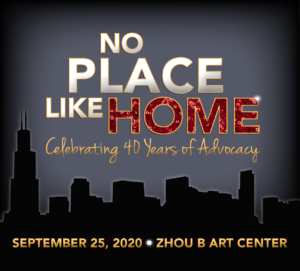By Niya K. Kelly, Director of State Legislative Policy, Equity and Transformation
Illinois residents who are homeless have the right to vote in upcoming local, state, and national elections.
If someone lives on the street, in shelters, or doubled-up in the homes of others, they are considered homeless.
In Illinois, adults can vote on Election Day even if they are not yet registered to vote. Election Day polls are open from 6 a.m. to 7 p.m.
The Primary Election on Tuesday, March 17 will help decide which candidates appear on the ballot in the General Election on Tuesday, November 3. This includes some countywide offices, state legislators, U.S. congressional representatives, and presidential nominees.
Illinois uses a closed primary system: Voters must declare party affiliation and will receive one political party’s ballot. The voter then chooses from candidates on their political party’s ballot.
Check online to see if you are already registered: https://ova.elections.il.gov/RegistrationLookup.aspx
You can register to vote on Election Day!
Any Illinois resident can register to vote on Election Day only at the precinct polling place assigned to his/her/their residential mailing address — that is, the address provided on one’s state I.D. or driver’s license.
You are required to bring two (2) forms of identification (ID), including one that shows proof of residence or a mailing address.
What are acceptable forms of ID?
Acceptable forms of ID include mail postmarked to the applicant; an Illinois driver’s license or state ID card; a municipal ID card (for example, the Chicago CityKey); an employee or student ID; Social Security card; birth certificate; credit card; valid U.S. passport; lease or rental contract.
As one form of ID, a homeless person can provide a letter from a drop-in center, shelter, or the person in whose home they are living doubled-up. The letter must confirm that the named person has permission to use their address for the purpose of registering to vote.
People experiencing homelessness can exercise their right to vote, as protected by state and federal laws, including the 2013 Illinois Bill of Rights for the Homeless Act.
To register to vote, you must be a U.S. citizen; at least 18 years old on or before the November 3 General Election; and you cannot claim the right to vote elsewhere.
If you are in pretrial detention and have not been convicted, you remain eligible to vote. But you cannot vote if you are currently incarcerated for a conviction. Learn more about voting in pre-detention.
In Illinois, if you have a driver’s license or state ID card, you can register online until Sunday, March 1 via the Illinois State Board of Elections website.
Key Dates
Can register online until Sunday, March 1, 2020
Early Voting: Monday, March 2 through Monday, March 16, 2020
“Grace Period” Voter Registration & Voting: Wednesday, February 19, 2020 through Election Day, Tuesday, March 17, 2020
Election Day Registration & Voting (Call local election office): Tuesday, March 17, 2020
When is ID needed and not needed to vote?
Identification is not necessary if the homeless voter has already registered to vote at the polling place; the signature s/he/they provides matches the one on file; and an election judge does not challenge the person’s right to vote.
But identification is necessary if the homeless voter faces these situations:
– S/he/they registered by mail and did not include the Illinois ID/driver’s license number or Social Security number.
– An election judge challenges the person’s right to vote. Please note: A common reason for challenging a person’s right to vote occurs after the Board of Elections has sent mail to verify a voter’s mailing address, but the mail was returned.
– If a voter needs to show ID but cannot present ID, s/he/they may cast a provisional ballot. In order for that provisional ballot to be counted, the voter must present ID within seven (7) days of the election to the Board of Election.
Voting after a recent move, whether homeless or housed
If you moved within the same precinct within 27 days of the election, you can vote a full ballot by signing an affidavit.
If you moved outside of your precinct more than 30 days before the election and did not register in your new precinct, you may grace-period update your registration through Election Day, and then grace-period vote.
If you moved outside of your precinct less than 30 days before the election, but still live in Illinois and did not transfer your registration, you may grace-period update your registration to your new address through Election Day and grace-period vote. Or, you can vote a full ballot in your old polling place after completing an affidavit.
For Election Day assistance, call these legal help desks:
– Chicago Board of Elections, (312) 269-7870
– Cook County Clerk Karen Yarbrough, (312) 603-0236
– Illinois State Board of Elections has phone numbers in Chicago at (312) 814-6440, and in Springfield at (217) 782-4141. Operators will be standing by until 11 p.m in Chicago and until 12 midnight in Springfield.


 **Due to the CDC recommendation to cancel all gatherings of 50 or more people through mid-May, we have decided to postpone this event until September 25.**
**Due to the CDC recommendation to cancel all gatherings of 50 or more people through mid-May, we have decided to postpone this event until September 25.**